
Non-Coding RNA Explosion: Novel Implications in Neurotrophin Biology
FIRB, MIUR-Cineca
Summary
The main focus of the project is the identification of non-coding RNAs (ncRNA) that regulate the expression of Neurotrophins (NT) and NT receptors (NTR). ncRNAs are a novel class of regulatory molecules that have been shown to be involved in almost all biological phenomena, including development and physiology of the nervous system.
Neurotrophins (NT) (BDNF, NGF and NT sensu stricto) are growth factors that control development, differentiation, synaptic plasticity and survival of several types of neuronal and glial cells in the embryonic and adult central nervous system and sensory organs. Based on the NT role in development and physiology of the nervous system, the present project aims at extending our knowledge on NTs molecular pathways, with emphasis on the their relationships with stress, aging and diseases.
The project will take advantage of as bioinformatic, molecular, genetic, biochemical and behavioural multidisciplinary approaches, with the aim to acquire new insights on the genetic regulatory networks and on the functions exerted by NT and NT receptors during the correct development and in conditions of thermal, social and nutritional stress. A distinctive feature of this research proposal is the use of three different model systems: cells, mouse and zebrafish.
In summary, the main purpose of the present project is to study the molecular, cellular and behavioural phenotype of NTs and NTRs, with emphasis on the relationships of these molecules with stress, ncRNAs and neurodegenerative diseases (NDs).
We are knocking out the BDNF, one of the most known neurotrophin together NGF, in zebrafish using the CRISPR/Cas9 thecnology to he improve our understanding of the role played by NTs during embryonic development and adult brain physiology, with particular attention to the biomedical impact in terms of diagnosis and treatment of neurodegenerative diseases.
What we do
We built a national network, in which the Stazione Zoologica Anton Dohrn of Napoli is the leader Institute, with the aim to merge multidisciplinary approaches and competences to reveal the importance of NT during vertebrate’s brain development.
Partners
Stazione Zoologica Anton Dohrn, Napoli (Unit 1); Dipartimento di Biologia e Biotecnologie "Charles Darwin", Università di Roma Sapienza (Unit 2); Dipartimento di Scienze Biologiche, Università di Napoli Federico II (Unit 3); Laboratorio di Bioinformatica, Università del Sannio (Unit 4).
Research Area
Organismal Biology
Project Lifetime
21 March 2013 to 20 March 2018
SZN Role
Coordinator of the whole project and Research Unit 1
Principal Investigator
Funding Institution
Futuro In Ricerca (FIRB), http://futuroinricerca.miur.it; Ministero dell’Istruzione, dell’Università e della Ricerca (MIUR), http://www.istruzione.it
Grant no. RBFR12QW4I
Contribution to SZN
€369.443 (MIUR contribution)
Publications
D’Agostino Y, Locascio A, Ristoratore F, Sordino P, Spagnuolo A, Borra M* and D’Aniello S* (2015). A rapid and cheap methodology for CRISPR/Cas9 zebrafish mutant screening. Molecular Biotechnology, in press.
Meet the team
Salvatore D’Aniello, Ricercatore
Ylenia D’Agostino, PhD student
Annamaria Locascio, Ricercatore
Filomena Ristoratore, Ricercatore
Paolo Sordino, Ricercatore
Antonietta Spagnuolo, primo Ricercatore

Empowering an integrated platform for the study of human diseases with great impact by means of system phenotyping of model animals: mouse and zebrafish clinic (MouZeCLINIC).
Summary
MouZeCLINIC is an infrastructural and training network in biomedicine by means of acquatic and terrestrial model organisms. Through the use of advanced methods of genetic analysis and imaging technologies, MouZeCLINIC aims at performing system phenotyping in zebrafish and mouse models of human diseases. MouZeCLINIC is training a new generation of young researchers by combining the strengths of modern technologies with a real understanding of traditional approaches. The MouZeCLINIC consortium involves two research centers and one academic institution that will provide the MouZeCLINIC fellows with expertise, specialized equipment and training on a wide range of approaches and methodologies incorporated in developmental genetics and translational medicine.
What we do
We are one of the three partners and are contributing by training students, by developing a zebrafish infrastructure and by studying fish models of neuroinflammation, toxicity and metabolism.
Partners
BioGem scarl – Ariano Irpino (Avellino) - IT; Stazione Zoologica Anton Dohrn, Napoli – IT; Università della Magna Graecia – Germaneto (Catanzaro) - IT
Research Area
Organismal Biology
Project Lifetime
January 2012 to July 2015
SZN Role
Partner
Principal Investigator
Funding Institution
Ministero dell’Istruzione dell’Università e della Ricerca (MIUR):
Programma Operativo Nazionale - ”Ricerca e Competitività” 2007-2013
Grant no. PONa3_00239
Contribution to SZN
Infrastructure € 1.273.424,00 (MIUR contribution)
Training € 733.670,00 (MIUR contribution)
Dedicated website
http://www.ponrec.it/open-data/risultati/potenziamento-strutturale/pona3_00239
Publications
Pappalardo A, Porreca I, Caputi L, De Felice E, Schulte-Merker S, Zannini M, Sordino P (in press) Thyroid development in zebrafish lacking TAZ. Mechanisms of Development.
Fortunato AE, Sordino P, Andreakis N (in press) Evolution of the SOUL heme-binding protein superfamily across Eukarya. J Molecular Evolution.
Porreca I, D’Angelo F, Gentilcore D, Carchia E, Amoresano A, Affuso A, Ceccarelli M, De Luca P, Esposito L, Guadagno FM, Mallardo M, Nardone A, Maccarone S, Pane F, Scarfò M, Sordino P, De Felice M, Ambrosino C (2014) Cross-species toxicogenomic analyses and phenotypic anchoring in response to groundwater low-level pollution. BMC Genomics 15: 1067.
De Felice E, Porreca I, Alleva E, De Girolamo P, Ciriaco E, Germanà A, Sordino P (2014) Localization of BDNF expression in the developing brain of zebrafish. Journal of Anatomy 224: 564.
Ferriero R, Manco G, Lamantea E, Nusco E, Ferrante MI, Sordino P, Stacpoole PW, Lee B, Zeviani M, Brunetti-Pierri N (2013) Phenylbutyrate therapy for pyruvate dehydrogenase complex deficiency and lactic acidosis. Science Transl Med, 5 (175): 175ra31.
Porreca I, De Felice E, Fagman H, Di Lauro R, Sordino P (2012) Zebrafish bcl2l is a survival factor in thyroid development. Developmental Biology 366:142.
Meet the team
Paolo Sordino, ricercatore
| SZN participation to Editorial Boards of International Scientific Journals |
||
| Researcher | Role | Journal |
| Ina Arnone | Associate Editor | Marine Genomics |
| Ina Arnone | Reviewer Editor | Frontiers in Cell and Developmental Biology, section Evolutionary Developmental Biology |
| Giovanna Benvenuto | Review Editor | Frontiers in Physiology |
| Iacopo Bertocci | Associate Editor | Hydrobiologia |
| Iacopo Bertocci | Editorial Board | Dataset Papers in Science (subject area: Ecology) |
| Christophe Brunet | Editorial Board | Functional Plant Science and Biotechnology |
| Christophe Brunet | Editorial Board | Advances in Oceanography and Limnology |
| Raffaella Casotti | Editorial Board | Marine Ecology |
| Maria Costantini | Associate Editor | Genome Biology and Evolution |
| Maria Costantini | Guest Editor | Special Issue di Marine Genomics "The Marine Genome: Structure, Regulation and Evolution" |
| Graziano Fiorito | Associate Editor | Frontiers in Physiology |
| Maria Cristina Gambi | Associate Editor | Marine Ecology |
| Sandra Hochscheid | Associate Editor | Endangered Species Resarch |
| Sandra Hochscheid | Associate Editor | Chelonian Conservation and Biology |
| Adrianna Ianora | Editorial Board | Scientia Marina |
| Adrianna Ianora | Editorial Board | Advances in Oceanography and Limnology |
| Adrianna Ianora | Review Editor | Marine Ecology Progress Series |
| Adrianna Ianora | Review Editor | Frontiers in Marine Biotechnology |
| Adrianna Ianora | Academic Editor | PLoS ONE |
| Wiebe Kooistra | Assistant Editor | PROTIST |
| Wiebe Kooistra | Assistant Editor | European Journal of Phycology |
| Chiara Lauritano | Editorial Board | Journal of Coastal Life Medicine |
| Chiara Lauritano | Editorial Board | Jacobs Journal of Physiology |
| Maria Grazia Mazzocchi | Editorial Board | Marine Ecology |
| Maria Grazia Mazzocchi | Handling Editor | Mediterranean Marine Science |
| Marina Montresor | Editorial Board | Harmful Algae |
| Francesco Paolo Patti | Contributing Editor | Aquatic Biology (in queste discipline: Genetics, phylogeography, invasive species) |
| Francesco Paolo Patti | Co-Editor | Malacological Bulletin (in queste discipline: Genetics, Molecular Taxonomy) |
| Gabriele Procaccini | Editorial Board | Marine Ecology |
| Gabriele Procaccini | Editorial Board | Marine Genomics |
| Maurizio Ribera | Editorial Board | Marine Ecology |
| Maurizio Ribera | Guest Editor | Special issue di Estuarine, Coastal and Shelf Science |
| Luigia Santella | Editorial Board | Biochemical Biophysical Research Communications |
| Luigia Santella | Editorial Board | Zoological Letters, the official Journal of the Zoological Society of Japan |
| Luigia Santella | Editorial Board | Zygote |
| Diana Sarno | Associate Editor | Cryptogamie Algologie |
| Paolo Sordino | Review Editor | Frontiers in Ecology and Evolution |
| Elisabetta Tosti | Editorial Board | Marine Drugs |
| Elisabetta Tosti | Editorial Board | Journal of Marine Science Research & Development |
| Elisabetta Tosti | Editorial Board | Journal of Fertilization: In Vitro - IVF-Worldwide, Reproductive Medicine, Genetics & Stem Cell Biology |
| Adriana Zingone | Handling Editor | Mediterranean Marine Science |
Summary
The DIsCO project, Diatom life cycles, molecular controls and contribution to ecosystem dynamics, is part of the Marine Microbial Initiative promoted by the Gordon and Betty Moore Foundation.
In this highly multidisciplinary project, laboratory approaches, studies at sea and modelling approaches are combined to answer various questions related to the life cycle of the diatom Pseudo-nitzschia multistriata. In particular we aim to i) understand the endogenous mechanisms that control the diatom life cycle (what are the signal transduction mechanisms? What are the gene networks involved? Is there an epigenetic control in the transitions between the life cycle phases?); ii) follow the natural populations at sea through population genomics, in order to understand the genetic structure but also the dynamics of genome evolution; iii) estimate how much the genetic diversification processes are guided by environmental factors, how much genetic diversity is the result of the neutral interaction between cell division, genetic mutation and recombination, and what is the expected effect of environmental perturbations on rates of division, mutation and recombination.
The project foresees the development and application of technologies that are innovative for phytoplankton, including the ATAC-seq method for epigenetic studies, the CRISPR/Cas9 technology for the study of gene function, and single-cell transcriptomics for the analysis of the different sexual stages.
The possibility of formulating hypotheses in the laboratory and verifying them with data obtained at sea, and vice versa, and the synthesis envisaged through modelling give this project a highly innovative connotation.
Projects outputs will be an increased knowledge on the microscopic component of marine ecosystems, improved understanding of genome evolution dynamics and of the evolutionary consequences of the process of sexual reproduction in a marine unicellular organism.
What we do
The SZN is involved in all project activities. To address the different questions, part of the study is carried out by laboratory experimentation with advanced functional genomics techniques, part involves sampling at the the long-term LTER-MareChiara series site in the Gulf of Naples and in other Mediterranean sites, and a third part involves the application of modeling approaches. High-throughput sequencing methods and advanced bioinformatics analyses are applied for different aspects of the project.
Partners
Stazione Zoologica Anton Dohrn, Napoli, Scuola Internazionale Superiore di Studi Avanzati (SISSA), Trieste.
Research Area
Functional Genomics, Genome Evolution, Population genetics, Modelling
Project Lifetime
December 2018 - November 2021
SZN Role
Coordinator
Principal Investigator
Project Leader
Funding Institution
The Marine Microbiology Initiative funded by the Gordon and Betty Moore Foundation (USA)
Dedicated website
Under construction
Personnel involved
Mariella Ferrante, Principal investigator
Marina Montresor, Senior Researcher
Daniele Iudicone, Senior Researcher
Domenico D’Alelio, Researcher
Rossella Annunziata, Researcher
Francesco Manfellotto, Post-doc
Pina Marotta, Post-doc
Maria Valeria Ruggiero, Post-doc
Monia Teresa Russo, Technician
Pasquale De Luca, Senior Technologist
Elio Biffali, Senior Technologist
Gabriele Procaccini, Research Director
Basic Activities
Preparation of media and plate for bacteriology and media for animal cell culture, supply of restriction and modifying enzymes, supply of several products and reagents for Molecular Biology and ISH experiments, preparation of competent cells for bacterial transformation etc. Besides the Service handles the provisioning of normal and modified synthetic oligonucleotides satisfying all the needs of the Institute.
Specialistic Activities
Specialistic activities includes a portfolio of services with high technological content, not feasible to individual laboratories, which require the use of high cost equipment in terms of purchasing and management, and that require a specific in-depth know-how. The centralization of these technologies allow a optimized management, which makes them accessible, at a competitive cost, to all the laboratories of the Institute and to the entire scientific community. The technological offer, in fact, besides being attractive to the scientific community has allowed the participation of the Service as a technology platform in various Network of Excellence like Marine Genomics or the Assemble project.
Sequencing
DNA automated capillary electrophoresis sequencing still remains a major and indispensable tools for the study of nucleic acids. Sequences produced are ~ 650 bases long in average with more than 97.5% accuracy, starting from plasmids, PCR fragments, phages. The potentiality of the system endowed by the Service is more than 1000 sequences/day and it can support high productivity projects too. The Service at the moment produces more than 15'000 sequences per year.
Genotipizzazione
About 6,000 samples analysed per year, mainly for genetic population studies of algae.
Genotyping is the process that allows to identify the genotype of an organism by biological testing (genotype testing). There are several techniques that can be used for genotyping mainly with a multi-locus or single-locus approach. The service offers three different analytical approaches:
- Microsatellites (single-locus).
Fragments analysis is achieved by capillary electrophoresis and applied to population genetics studies, primarily on aquatic plants (seagrasses) and algae. We analyze an average of 6000 samples per year. - SNiPs, analysis of polymorphism in single base (single-locus). SNiPs analysis is realized at the SBM using the Snapshot technology that allows the analysis, through capillary electrophoresis, of any samples with the use of only one specific oligonucleotide.
- AFLP, amplified fragment lenght polymorphism (multi-locus). The detection is realized at SBM through capillary electrophoresis.
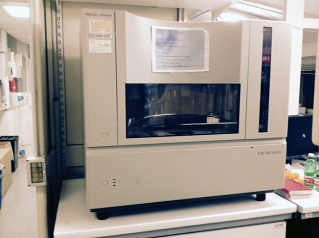
Instrumentation:
Applied Biosystems (Life Technologies) 3730 DNA Analyzer 48 capillaries - Read more
RealTime qPCR
The Real-Time qPCR (or quantitative PCR) is a technology that in recent years it grew rapidly and now constitutes a gold-standard in gene expression study. The Service supports the Institute's laboratories in experiments design, samples running and, if required, data analysis.
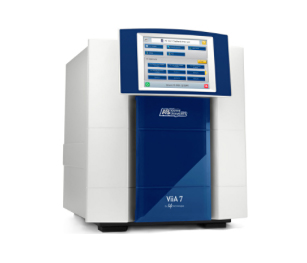 Instrumentation:
Instrumentation:
Applied Biosystems (Life Technologies) ViiA7 384 wells format. - Read more
Sample QC Bioanalyzer
For samples quality control of the of nucleic acids one of the technologies most widely used and recognized is the microfluidic chip analysis made by Bioanalyzer (Agilent Technologies). The service was equipped in 2010 with this instrumentation and offers the analysis of samples and advice on the results interpretation.
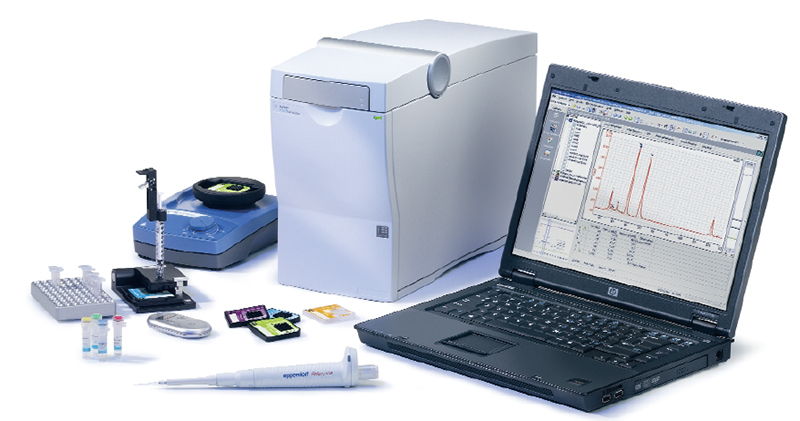 Instrumentation:
Instrumentation:
Agilent Bioanalyzer 2100 - Read more
Lab. Automation and High throughput projects
The Service is equipped with a robotic system able to realize high productivity projects for the research activities that needs, in brief times, the analysis of an high number of samples. The Service is able to accomplish to different demands:
- PCR setup.
- PCR cleanup.
- Samples quantitation and normalization.
- Replica plates, cherry picking and gridding, library replica and re-gridding etc.
- Plasmidic DNA minipreparations.
- Sequencing reactions setup.
- Sequencing reactions cleanup.
- Microsatellites plates setup.
- AFLP plates setup.
- SNiPs plates setup.
- Library management and cherry picking.
- gDNA extraction, conventional samples (blood, mouse tail, etc.).
- gDNA extraction, NON conventional samples (Ciona; Posidonia oceanica; Caretta caretta; Cymodocea nodosa; Caulerpa racemosa; Octopus vulgaris).
- Automated ICH-ISH in whole mount on larger embryos. (in progress).
La piattaforma HTS è stata implementata con l’acquisizione del TECAN FREEDOM EVO 200 che sostituirà l’attuale BECKMAN COULTER BFX nel primo trimestre 2016.
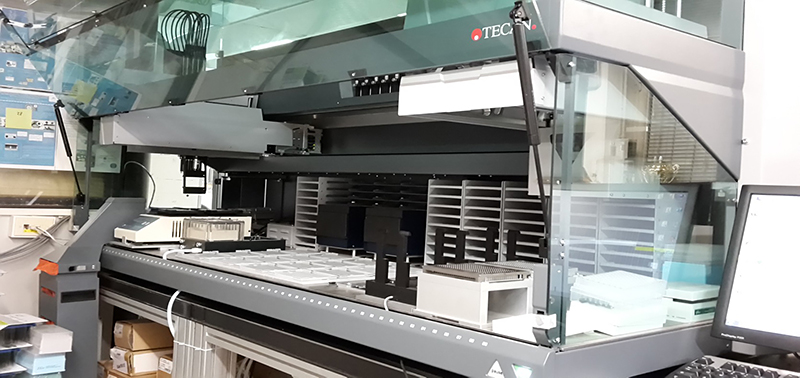 Instrumentation:
Instrumentation:
HTS platform TECAN FREEDOM EVO 200 liquid handler dual harm system - Read more
Next Generation massive parallel Sequencing
The Next Generation Sequencing technologies (NGS) is revolutionizing the molecular biology field of application. Recently the Molecular Biology Service was implemented by such technologies and is developing this facility based on a ION Proton sequencer.
The Next Generation Sequencing facility is based on the ION Proton technology: mainly transriptomics, gene expression analysis, targeted resequencing, metagenomics.
To date no bioinformatic analysis provided.
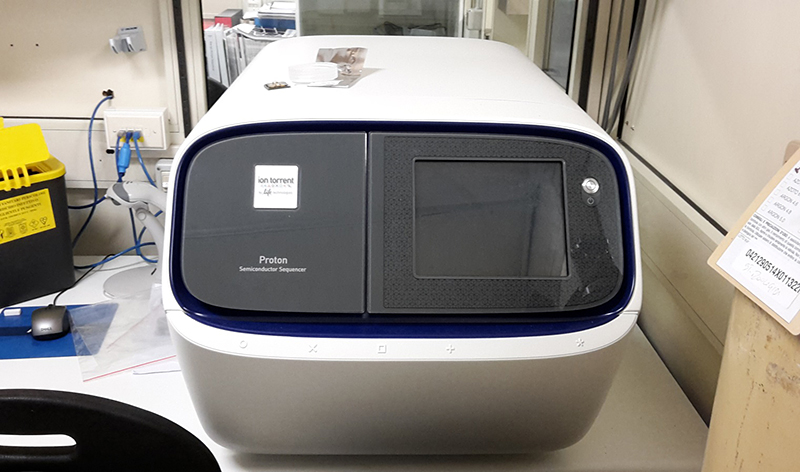 Instrumentation:
Instrumentation:
NGS sequencing platform, ION Proton system, Applied Biosystems - Read more
Moreover the Service offers technical-scientific consultation, training, technical and market survey, comparative tests of new products and protocols and often is involved in scientific and technical-scientific collaborations with laboratories of other Research Institutes and in partnership with companies operating in the Molecular Biology compartment.










